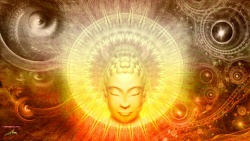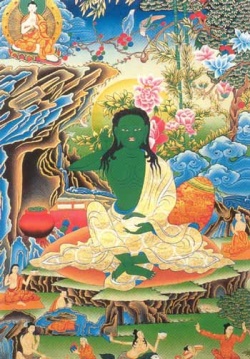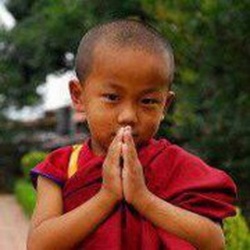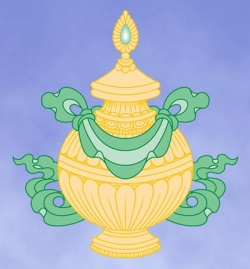Buddhist and Christian Q & A
Q: What are the main differences between Christianity and Buddhism?
A: Essentially it is this: Buddhists do not believe in a personal creator God. The idea that a supreme being made everything which consequently makes us mere puppets of his will is rejected by the Buddha.
Q: But how did the universe originate?
A: How does a thought originate? How does a thought perish? How does a mental conception of God arise? How is this mental image, in essence, different from the mental conception of a house cat? This is what should interest us. Asking questions about how the universe originated leads to nothing but more unanswered questions. Speculation like this is the pastime of those addicted to mentally constructed images who have never gone beyond them and who are still espoused to imaginary thinking.
Q: But there had to be something that created everything, right?
A: There may well be a cause as to why certain things come into existence and perish, but that this is the workings of Zeus is a little farfetched. By the way, that is an astonishing leap in logic. For example, I can attribute the cause of water becoming hot to the action of fire. But to say that a fire god is responsible for heating my tea water is just plain silly.
Q: Did the Buddha believe in any kind of gods?
A: He didn’t just believe—he realized there were gods. When asked by a Brahmin youth if there were gods, the Buddha said in the affirmative that he knew there were gods. Let me also say that the Buddha never denied the existence of morally perfect gods such as Brahma or a hierarchy of Brahmas. But as to their being omniscient and omnipotent, the Buddha didn’t buy that.
Q: Did the Buddha acknowledge a heaven?
A: Yes, the Buddha acknowledged heavens which were far better than human existence. He also acknowledged hells in which there was no good life nor righteous living, as the stronger preyed on the weaker.
Q: Concerning the teachings of the Buddha and Jesus, don’t you see both of their teachings as being basically the same?
A: Not really. In certain areas there might be parallels. But to see them as equal is to gloss over some key differences. For one thing, in Buddhism we have to work out our own salvation. We don’t expect a savior to do it for us.
With regard to karma, as I understand it, Christians don’t believe that every volitional action has a consequence. Instead, they ask for forgiveness so as to erase the previous error. This, as I see it, can lead to immorality as there are no actual consequences for inappropriate actions.
Q: But don’t you want to give people another chance?
A: In Buddhism everyone has another chance—in fact many lifetimes of other chances. But with karma, at some future point, everyone will still have to pay for their mistakes. No free lunches here. You goof, you pay.
Q: What are some of the other differences between Christianity and Buddhism?
A: As I see it, to be frank, Christianity has no system of virtues and wisdom whereby one learns how to become detached from the sensuous world and thereby realize one’s fundamental nature. Nor, have I met any Christians who really know how to deal with their ignorance, desire, and hatred except to pray when they are in a jam. Where is meditation? Where is practice? Where is the Eight Fold Path?
Q: But I see Christians trying to be wise and virtuous; making real efforts to know who they are.
A: Such actions seem to be inconsistent with Christianity. For, if Jesus had rid the world of sin, declaring in effect, that sin has no power over us, then what more is there to be done, except wait to die hoping eventually to go to heaven? I think at some level that most Christians don’t buy this. Looking at our daily life, to get any place requires hard work. Why should religion be any easier?
Q: Do you accept Jesus as your teacher in some way?
A: Of course not. The Buddha is my teacher. Accepting Jesus, on the other hand, is accepting a hodgepodge of contradictory Christologies; many of which make little or no sense to me. In one Christology, we are to believe that when we drop dead we shall have to wait in our graves for Jesus to comeback who will then judge us according to how obedient we were to the Church when we were alive.
Q: But how can you accept the Buddha as being the teacher if Jesus had a miraculous birth?
A: The Buddha himself had a divine birth; much more divine than Jesus. The baby Buddha was unsoiled by the impurities of womb birth. I don’t recall the birth of Jesus being anything more than an ordinary exit from his mother’s womb. Our baby Buddha was not an ordinary baby. He was like shining gold, shining like the sun. After he was born, he took seven steps and declared himself to be master of the cosmos. And then he laughed the loudest laugh, knowing this was to be his last birth on earth. Now that to me is much more divine than the birth of Jesus which is not even mentioned in two of the four Gospels! Be honest—don’t you think that Christians borrowed the idea of a divine birth from Buddhists since the Buddha was born over five hundred years before Jesus?
Q: Well that is possible—but not likely. What do you think about people who worship both the Buddha and Jesus and try to combine both religions?
A: I would say that they are possibly confused. How can you combine fish with ice cream? What is the point when Buddhism offers 84,000 Dharma gates by which anyone can reach the summit of wisdom? Buddhism has something for every religious disposition.
Q: But since the United States is a Christian nation, shouldn’t you attempt to be a little bit more Christian in your thinking?
A: The last I read, George Washington and the Senate declared in the Treaty with Tripoli, that the United States was not a Christian nation. The early Presidents were, in fact, Deists rather than Christians. They believed in God, but not in Jesus. So no, I don’t feel I have to be more Christian in my thinking. As I tolerate Christians, so must they tolerate Buddhists.
Q: What is your impression of Christian Gnostics ?
A: I think it is a much better form of Christianity than fundamentalism which I have been more or less addressing in my remarks. But I don’t really know that much about it. It is Christian mysticism is it not?
Q: Yes, I believe so. By the way, what is your definition of "mysticism"?
A: Well, consistent with mysticism is the radical transcendence of the world and self. This formula certainly rings with Buddhism. If Christian Gnosticism chimes with this, it is fine with me.
Q: Do Buddhists try to actively convert people to their religion?
A: No. The Buddha didn’t wish to knock over other people’s religions, hoping to gain converts. However, he did disagree with various religious attitudes. But I think overall he saw the big picture and realized that eventually most people would come to Buddhism. In a way, Buddhism is like a Rolls Royce. You don’t have to advertise a good thing.
Q: How can we learn to get along if we can’t share the same religion?
A: The same way we learn how not to wipe out our fellow human beings who like Mexican food, or Chinese food—foods which we, ourselves, might dislike. Personally, I feel that one doesn’t have to look for deep causes as to why people of different religions don’t get along. If you see a man in Buddhist robes or see a Rabbi in his attire, leave them alone. They are having a divine meal. Let them eat in peace.




